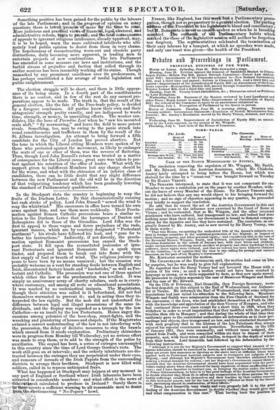The election struggle will be short, and there is little
appear- ance of its being sharp. In a fourth part of the constituencies there is no contest, and in few of the rest do any earnest pre- parations appear to be made. The truth is, that the result of the general election, like the fate of the Free-trade policy, is decided by a foregone conclusion. All parties know their own and their antagonists' strength pretty exactly, and are indisposed to waste time, strength, or money, in unavailing efforts. The weaker can- didates, like the hero of Paradise Lost when he " saw his mounted scale aloft," " fly murmuring," and leave the field to more _potent rivals. Something, too, may be owing to the panic struck into venal constituencies and traffickers in them by the result of the St. Albans investigation. An attempt to bring forward a fifth candidate for the City of London has proved abortive. But the tone in which the Liberal sitting Members were spoken of by those who protested against the movement, as likely to endanger the seats of one or other of them, was the reverse of flattering. Thus, though Lord John Russell's return was treated as a matter of consequence for the Liberal cause, great care was taken to pro- test against his retention of the office of leader. What with the support given to indifferent Members lest any change should be for the worse, and what with the obtrusion of an inferior class of candidates, there can be little doubt that any slight difference between the new Parliament and the old will be in the direction of that vulgarizing tendency which has been gradually lowering the standard of Parliamentary qualifications.


























 Previous page
Previous page